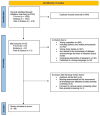Exploring measurement tools used to assess knowledge, attitudes, and perceptions of pregnant women toward prenatal screening: A systematic review
- PMID: 39206551
- PMCID: PMC11363050
- DOI: 10.1177/17455057241273557
Exploring measurement tools used to assess knowledge, attitudes, and perceptions of pregnant women toward prenatal screening: A systematic review
Abstract
There is a lack of standardized measurement tools globally to assess knowledge, attitudes, and perceptions of expecting women toward prenatal screening. The purpose of this systematic review was to identify reasons women pursue or decline prenatal screening and compare the strengths and limitations of available measurement tools used to assess pregnant women's perceptions, knowledge, and attitudes toward prenatal screening. This review followed the five-step York methodology by Arksey and O'Malley and incorporated recommendations from the Preferred Reporting Items for Systematic Reviews and Meta-Analysis checklist for the extraction, analysis, and presentation of results. The five steps consisted of: (1) identification of the research questions; (2) searching for relevant studies; (3) selection of studies relevant to the research questions; (4) data charting; and (5) collation, summarization, and reporting of results. Four online databases (PubMed, Embase, Web of Science, and Cochrane Library) were selected after the librarian's development of a detailed search strategy. The Rayyan platform was used between June 2023 and August 2023 to epitomize the articles produced from our search. A total of 68 eligible studies were included in the analysis. The top five major reasons for declining prenatal screening uptake included (1) being unsure of the risk of prenatal screening and harm to the baby or miscarriage (n = 15), (2) not considering action such as termination of pregnancy for prenatal screening to be considered as necessary (n = 14), (3) high cost (n = 12), (4) lack of knowledge about testing procedures and being anxious about the test (n = 10), and (5) being worried about probability of false negative or false positive results (n = 6). Only 32 studies utilized scientifically validated instruments. Difficulties in capturing representative, adequately sized samples inclusive of diverse ethnicities and demographics were pervasive. Findings highlight the need for rigorous validation of research measurement methodologies to ensure the accuracy and applicability of resulting data regarding the assessment of prenatal screening perceptions, knowledge, and attitudes across diverse female populations.Registration: N/A.
Keywords: attitudes; knowledge; measurement tools; perceptions; pregnant women; prenatal screening.
Plain language summary
Measurement tools used to assess knowledge, attitudes, and perceptions of pregnant women toward prenatal screeningThe following systematic review provides a comprehensive summary and quality evaluation of measurement tools used globally to assess the role of knowledge, attitudes, and perceptions of pregnant women in seeking prenatal tests.
Conflict of interest statement
The authors declared no potential conflicts of interest with respect to the research, authorship, and/or publication of this article.
Figures
References
-
- Cuckle H, Maymon R. Development of prenatal screening—a historical overview. Semin Perinatol 2016; 40(1): 12–22. - PubMed
-
- Prenatal testing: is it right for you? Mayo Clinic, https://www.mayoclinic.org/healthy-lifestyle/pregnancy-week-by-week/in-d... (2022, cited 22 March 2024).
-
- Jelin AC, Sagaser KG, Wilkins-Haug L. Prenatal genetic testing options. Pediatr Clin North Am 2019; 66(2): 281–293. - PubMed
-
- Jenkins M, Seasely AR, Subramaniam A. Prenatal genetic testing 1: screening tests. Curr Opin Pediatr 2022; 34(6): 544–552. - PubMed
-
- Skotko BG. Prenatally diagnosed Down syndrome: mothers who continued their pregnancies evaluate their health care providers. Am J Obstet Gynecol 2005; 192(3): 670–677. - PubMed
Publication types
MeSH terms
LinkOut - more resources
Full Text Sources
Medical


